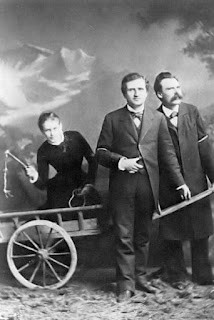Imagen: Lou Sandreas-Salomé, Paul Rée y Nietzsche, 1882.
 El autor presenta los rasgos que, según Federico Nietzsche, marcan la crisis de Occidente y su decadencia. No se pretende aquí probar ninguna tesis positivamente sino exponer la percepción que Nietzsche tuviera de la crisis de Occidente y hacer algunas observaciones finales. Según Nietzsche, desde sus principios vitalistas e irracionalistas, esta crisis está signada por el abandono de lo trágico y dionisíaco que se hallaba en la tradición griega presocrática. El socratismo ha osificado la vida encuadrándola en lo conceptual, con lo cual Occidente adquirió un dominio destructivo sobre la naturaleza tanto física como humana. Occidente se ha creado según Nietzsche sobre ficciones. El hombre superior es aquel que comienza a poner como valor primero la buena conciencia de los instintos, reprimidos por los valores decadentes. Finalmente, se analizan algunos aspectos que el autor considera positivos y otros negativos del pensamiento nietzscheano.
El autor presenta los rasgos que, según Federico Nietzsche, marcan la crisis de Occidente y su decadencia. No se pretende aquí probar ninguna tesis positivamente sino exponer la percepción que Nietzsche tuviera de la crisis de Occidente y hacer algunas observaciones finales. Según Nietzsche, desde sus principios vitalistas e irracionalistas, esta crisis está signada por el abandono de lo trágico y dionisíaco que se hallaba en la tradición griega presocrática. El socratismo ha osificado la vida encuadrándola en lo conceptual, con lo cual Occidente adquirió un dominio destructivo sobre la naturaleza tanto física como humana. Occidente se ha creado según Nietzsche sobre ficciones. El hombre superior es aquel que comienza a poner como valor primero la buena conciencia de los instintos, reprimidos por los valores decadentes. Finalmente, se analizan algunos aspectos que el autor considera positivos y otros negativos del pensamiento nietzscheano.
The nietzsche´s perception of the western crisis
Abstract
The author presents the features that, according to Federico Nietzsche, mark the crisis of the West and its decline. It is not intended here to prove any thesis positively but to expose Nietzsche's perception of the crisis in the West and to make some final observations. According to F. Nietzsche, from its vitalist and irrationalist principles, this crisis is marked by the abandonment of the tragic and Dionysian that was in the pre,Socratic Greek tradition. Socratism has ossified life by framing it in the conceptual, with which the West acquired a destructive domination over both physical and human nature. The West has been created according to Nietzsche on fictions. The superior man is the one who begins to put as value first the good conscience of the instincts, repressed by decadent values. Finally, some aspects that author considers positives and other negatives of the Nietzschean thought are analyzed.


